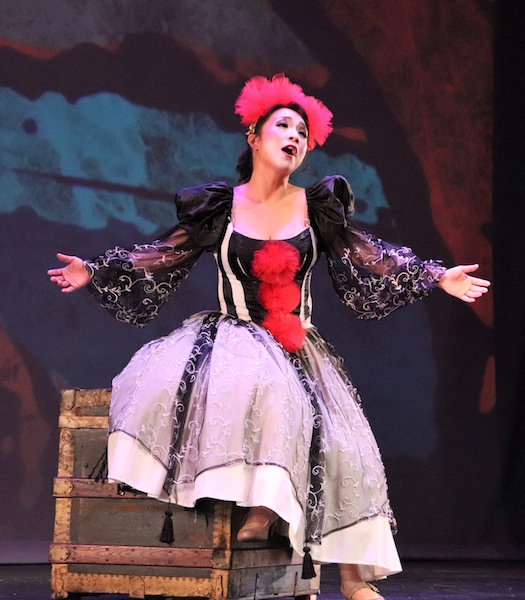Miami Music Festival delivers a quality performance of “Ariadne auf Naxos”

Gyehyun Jung as Zerbinetta in the Miami Music Festival production of Strauss’s “Ariadne auf Naxos.” Photo: Anjelica Perez
Richard Strauss’s sophisticated opera Ariadne auf Naxos is not an obvious choice for a student production.
The libretto, with its strange combination of broad comedy and Greek mythology, proved so baffling to the composer that he had to have it explained to him. The vocal parts are among the most demanding in opera. And as far as the plot goes, not much happens, except for murky stage action that provides the occasion for some of Strauss’s most beautiful music.
Yet the advanced students and young professionals of the Miami Music Festival put on a surprisingly credible performance of this subtle, difficult work. Clever stage direction and set design made the most of limited resources, using imagination and wit rather than a substantial production budget.
Barry University’s Shepard & Ruth K. Broad Performing Arts Center was probably one-third full at best Friday night—which is too bad considering the quality of the performance and more-than-reasonable $15 price for general admission tickets. The opera will be performed again Sunday, with different singers in the main roles.
The standout among the singers was the tenor Patrick Cook as Bacchus, a famously challenging role that demands immense, sustained power at the upper end of the vocal range.
Making a dramatic entrance from an aisle deep in the audience, he declaimed the name of the sorceress Circe in tones that rang through the hall. Throughout the next few minutes, as he rescued Ariadne from her bleak state, he sang with strapping virility and golden, clarion tones, helping to make the last part of the opera the climactic, transformative episode it should be.
As the Composer, the mezzo-soprano Sarabeth Belon sang with a sweet-toned, well-focused voice, with a lithe, vulnerable stage manner that expressed the Composer’s naive charm. As Ariadne, the soprano Alyssa Cox sang with warmth and reserves of power in the lower register, although toward the top her vibrato tended to spread too widely, leaving her tone insecure. In her long concluding scene with Bacchus, however, she sang in ample legato phrases, expressing her character’s escape from despair to joy.
The role of Zerbinetta, effectively portrayed by the soprano Gyehyun Jung, contains the big show-stopper aria of the opera, “Grossmächtige Prinzessin.” If her coloratura wasn’t note-perfect, it came pretty close, as she delivered all the runs and ornamentations that decorate this long speech to Ariadne. In her easy, informal stage manner, Jung’s Zerbinetta came off with unaccustomed depth, irritated at the crude antics of her assistants and wryly sympathetic to the pompous, theatrical grief of Ariadne.
Special mention should be made of the three nymphs, sung by Ann Marie Lacoviello as Naiad, Luisana Rivas as Dryad and Genevieve Gannon as Echo. Their ensemble phrases of church-bell purity and tonal richness gave an extra glow to important moments throughout the second half.
The orchestra under conductor Bradley Moore captured the lilt and tang of Strauss’s music, effectively supporting the singers and delivering substantial punch, with lustrous tones, at the big moments.
In an unusual move, the role of the Major Domo was taken by a woman, Marja Kari. It’s a spoken role, so the voice didn’t make much difference, and in passing on her unseen master’s insane performance demands, she was appropriately irritating, condescending and insufferable.
As the Dancing Master, Eric Asakawa enlivened the stage action with some impressive cartwheels, while managing to be both obsequious to the Prima Donna and irritating to the Composer. As the Music Master, Justin Colón came off as appropriately artsy, with his wire-rim glasses and mop of dark hair, consoling the desperate composer as his work looked like it would be ruined.
As Zerbinetta’s burlesque assistants, Asakawa, Jedidiah Rellihan, Logan Tarwater and Eric Viñas made an effective corps of crude buffoons, jarring to Ariadne in her grief. In his brief solo turn as Harlequin, Viñas sang well, with lively phrasing and a nice tone.
Stage Director David Carl Toulson did amn admirable job expressing all the pre-performance chaos at the Vienna mansion, while getting out of the way and keeping the focus firmly on the music at crucial moments.
Sets designed by Daniel Gelbmann and projections by Yee Eun Nam effectively set off the stage action and music, with three doors and a few steamer trunks in the opening, a few stone steps for Ariadne’s bleak island and projections that provided a delightful touch of fireworks at the end as Ariadne and Bacchus walk off the stage.
Ariadne auf Naxos will be performed again 2 p.m. Sunday at Barry University. The role of Ariadne will be sung by Lyndsey Swann, the Composer by Rebecca Sacks, Bacchus by Matthew Arnold, and Zerbinetta by Amber Romero. miamimusicfestival.com
Posted in Performances
Leave a Comment
Sat Jun 30, 2018
at 12:56 pm
No Comments




